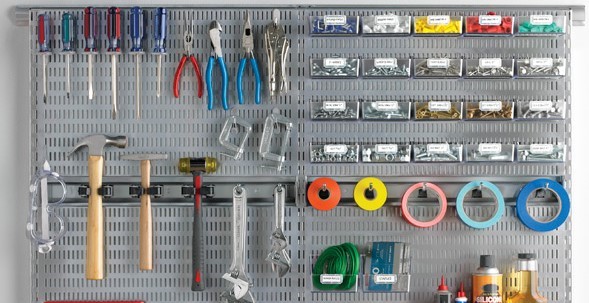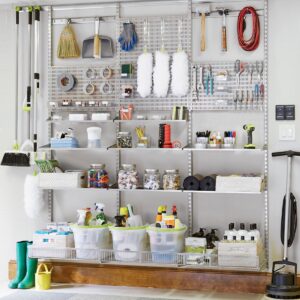Organizing your Boston basement and everything that goes in it

28 Aug 2019
Organizing your Boston basement and everything that goes in it.
 Often our basement becomes a dumping ground for all the items that don’t have a place in our main living areas. Tools, sports equipment, old toys, memorabilia and seasonal items have a way of piling up, especially when you have a big, open space to toss them in! You know what they say: “Out of sight, out of mind”.
Often our basement becomes a dumping ground for all the items that don’t have a place in our main living areas. Tools, sports equipment, old toys, memorabilia and seasonal items have a way of piling up, especially when you have a big, open space to toss them in! You know what they say: “Out of sight, out of mind”.
Whether you have a bright, finished basement or a dark cave-like space, a little organization can go a long way to creating a functional space.
The best way to tackle your basement is to focus on one category at time. Go through the space and pull out everything in a category, such as holiday decorations or off-season clothing. Start with the category you think you’ll have the easiest time sorting. You will find motivation to keep going from your accomplishments. If there are boxes you still need to unpack from your move five years ago, then go ahead and start there. Chances are if you haven’t opened them in years, you can get rid of most of the contents. Immediately toss or donate any unwanted items. Get them up and out of the basement right away to create space to sort.
Once you’ve cleared some space, sort items and create zones in your basement for each category. Things don’t have to be perfectly organized yet, but make sure you’re grouping like-items together in their zone. It helps to create signs and hang them on the wall to easily identify your categories.
Now it’s time to organize. Start with shelving (if you don’t already have it). Without shelving and containers, stuff will just end up piled up again.
Here are a few essentials that will help you organize your basement and be able to find what you need:
Shelving: Depending on your type of basement (dry or damp and full of spiders), chrome shelving is an attractive and versatile option. If you have a musty, dusty basement, then I recommend plastic shelving. Plastic shelving is easier to clean and won’t rust in a damp environment. These shelving options come in a variety of sizes, so be sure to measure first and see what will fit best in your space.
Wall Racks: There are some versatile wall mounted systems out there, like the Elfa utility system from the Container Store. They offer a variety of mix and match components to handle whatever you’ve got.
Containers: If your basement is damp, choose water-proof, air tight bins to pack smaller items like off-season clothes, holiday items, memorabilia, books, etc. Stack them or store them on shelves, depending on how often you need to access them.
For some of us, the basement doubles as the garage. For others, it’s a nice finished room. Your zones will vary depending on the space and what you have, but here are some ideas for the most common basement zones:
Sports and Gym Equipment: If you store your sports equipment in your basement, then a freestanding sports rack can hold a variety of items such as golf clubs, bats, balls, tennis rackets and more. Wall-mounted racks are good for bikes and skis and other bulky items. These racks work well for items that you don’t want to store too far away and may use all year round. If you have a home gym, create an area for working out with some mats and wall racks (and a fan!) to define the space.
Tools: If you have a workspace in your basement, then create a system for tools. For smaller tools, try a wall-mounted utility organizer board (a modern twist on the old pegboard). If you tend to carry your tools around, then I would opt for a toolbox or any container with handles for easy transport. If you don’t have a garage and you store everything in your basement, you can use a simple tack system with utility hooks for large tools, such as ladders, rakes, shovels, etc.
Toys: If you have a finished basement, you may want to make space for a playroom. Create a play zone and use child-friendly containers such as a toy box or open bins to keep things organized, but accessible. If you don’t have carpeting, put down a rug or a play pad to make it comfy for your kids to play (and for you to kneel and put things away!).
Off-season clothing, holiday decorations, etc.: Store in clear bins on shelves. Boston area basements are prone to flooding and shelves are a must for anything that can’t get wet.
Memorabilia: Create a limited space for this and try to let go of as much as you can. Store in acid free boxes, or air-tight containers. I would not recommend storing old photos or textiles in your basement (especially in New England). These items tend to disintegrate and take on a musty smell even in a “dry” basement.
Papers and Tax Records: First, shred and recycle almost all of it! There is very little you actually need to keep for tax purposes. If you are unsure, talk to your accountant. Anything left can be stored in bins. I like to use a small separate bin for each year. A sweater bin or men’s shoe box is the perfect size. Or use a clear bin that accommodates hanging files.
It may be out of sight but always keep your basement in mind. It’s a great extra space to have in your home for storage and activities, but you need to keep it organized or it will become a useless dumping ground.
